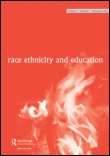
Race Ethnicity and Education
Scope & Guideline
Advancing equity through critical research.
Introduction
Aims and Scopes
- Critical Race Theory in Education:
The journal emphasizes the application of Critical Race Theory (CRT) to understand and challenge systemic racism in educational settings, highlighting the narratives and experiences of marginalized communities. - Intersectionality and Educational Experiences:
Research published in the journal frequently explores intersectionality, focusing on how race interacts with other identities, such as gender, class, and disability, affecting students' educational experiences and outcomes. - Policy Analysis and Advocacy:
The journal aims to assess and critique educational policies through a racial and ethnic lens, advocating for reforms that promote equity and justice in education. - Cultural and Linguistic Diversity:
A core focus is on the experiences of culturally and linguistically diverse students, investigating how educational institutions can better serve these populations. - Community Engagement and Activism:
The journal highlights the role of community engagement and activism in addressing educational inequities, showcasing grassroots efforts and local initiatives that strive for change.
Trending and Emerging
- Racial Microaggressions and Their Impact:
Recent papers increasingly focus on the experience of racial microaggressions within educational contexts, emphasizing their psychological and academic impacts on students. - Decolonization of Education:
There is a growing trend in research aimed at decolonizing educational practices and curricula, advocating for the inclusion of Indigenous and marginalized voices in educational discourse. - Mental Health and Racialized Experiences:
Emerging studies are highlighting the mental health challenges faced by racially minoritized students, linking these issues to systemic racism and educational environments. - Digital and Online Learning Contexts:
The journal is seeing an increase in research examining the implications of online learning and digital education for racially and ethnically diverse students, particularly in the wake of the COVID-19 pandemic. - Community-Based Educational Approaches:
There is a notable rise in research focused on community-based educational strategies that empower marginalized communities, emphasizing participatory approaches and local knowledge.
Declining or Waning
- Traditional Models of Diversity:
There is a noticeable decline in studies focused solely on traditional diversity models that emphasize representation without addressing systemic inequalities and power dynamics. - Generalized Educational Equity Discussions:
Discussions that broadly address educational equity without a specific focus on race or ethnicity are becoming less frequent, as the journal shifts towards more nuanced and targeted analyses. - Focus on Historical Perspectives:
Research that primarily emphasizes historical perspectives on race and education appears to be waning, with a growing preference for contemporary analyses that address current issues and challenges.
Similar Journals
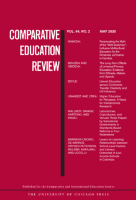
COMPARATIVE EDUCATION REVIEW
Illuminating Educational Practices Across Borders.Welcome to the Comparative Education Review, a premier journal published by University of Chicago Press, dedicated to advancing the field of education through comparative analysis. Established in 1976, this esteemed journal serves as a platform for scholars to disseminate innovative research that explores educational systems across diverse cultural and geographical contexts. With an impressive impact factor, the journal is ranked in the Q2 category within Education for 2023, reflecting its significant contributions to the field, as evidenced by its standing in the 67th percentile among peers. Although it does not offer open access, the journal publishes high-quality articles that are vital for educators, policymakers, and researchers alike, fostering a deeper understanding of global educational trends and practices. Covering a wide scope of topics—from policy analysis to pedagogical frameworks—the Comparative Education Review remains essential for those seeking to enhance educational strategies and outcomes worldwide.

Asia-Pacific Journal of Teacher Education
Elevating Educational Excellence in the Asia-Pacific Region.Asia-Pacific Journal of Teacher Education is a prestigious quarterly publication dedicated to advancing the field of education, particularly focusing on teacher education within the Asia-Pacific region. Published by Routledge Journals, Taylor & Francis Ltd, this journal holds a distinguished position as a Q1 journal in Education, reflecting its commitment to excellence with a Scopus rank of #328 out of 1543 in the Social Sciences Education category, placing it in the 78th percentile. The journal not only aims to disseminate high-quality research but also to foster dialogue among educators, policymakers, and researchers to improve teaching practices and learning outcomes. While it operates under a traditional access model, the journal provides valuable insights into the most pressing educational challenges and innovations, making it essential reading for those invested in teacher education and professional development. With a history of impactful contributions since its inception in 2006, the Asia-Pacific Journal of Teacher Education continues to stay relevant through 2024 and beyond, offering a vital platform for emerging scholarship and collaboration in the educational landscape.
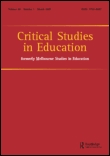
Critical Studies in Education
Fostering critical inquiry for a better tomorrow.Critical Studies in Education, published by Routledge Journals, Taylor & Francis Ltd, is a leading journal in the field of education, with a distinguished Q1 ranking in the 2023 category quartiles. This esteemed journal, accessible to scholars in the United Kingdom and internationally, showcases cutting-edge research and critical perspectives on educational practices, theories, and policies, addressing the complex dynamics shaping contemporary education. With an impressive Scopus rank of #51 out of 1543 within the Social Sciences Education category, it places itself in the 96th percentile, underscoring its significant impact within the academic community. Researchers, educators, and students will find in-depth articles that challenge conventional thought and promote innovative approaches to learning and pedagogy, ensuring that Critical Studies in Education remains an essential resource for those dedicated to advancing educational scholarship and practice from 2008 through to 2024.

Cultural Studies of Science Education
Fostering Collaboration in Science Education through Cultural StudiesCultural Studies of Science Education, published by Springer, is a leading journal in the field of cultural studies, with a specific focus on the intersection of science education and cultural analysis. With an ISSN of 1871-1502 and an E-ISSN of 1871-1510, this journal has demonstrated its commitment to high-quality research, evidenced by its impressive Q1 ranking in 2023 within the Cultural Studies category and a notable position in the 93rd percentile in Scopus Ranks for Social Sciences. Covering a wide array of interdisciplinary topics, the journal seeks to advance the understanding of how scientific knowledge and education are shaped by cultural contexts, making it a vital resource for researchers, educators, and policy makers. Operating from the Netherlands, the journal embraces an open access philosophy to ensure that cutting-edge research is accessible to all, fostering collaboration and innovation in the field. As we converge years from 2006 to 2024, Cultural Studies of Science Education continues to explore critical issues and innovative methodologies, aiming to inspire and inform the next generation of scholars and practitioners.
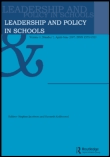
Leadership and Policy in Schools
Exploring the nexus of leadership and policy in education.Leadership and Policy in Schools is a premier academic journal published by Routledge Journals, Taylor & Francis Ltd, dedicated to advancing the field of education and management. With a strong focus on the interplay between leadership, policy, and educational practices, this journal provides a platform for researchers and practitioners to share their insights and findings. The journal is ranked in the Q2 category for both Education and Strategy and Management in 2023, showcasing its growing influence and positive impact on the academic community; specifically, it holds a significant position within the Scopus Ranks for social sciences and management disciplines. As it continues to publish high-quality research from 2010 to 2024, 'Leadership and Policy in Schools' plays a vital role in shaping policies and strategies that impact educational leadership, making it essential reading for professionals, educators, and scholars committed to fostering effective educational environments.

Magis-Revista Internacional de Investigacion en Educacion
Diverse Perspectives, Unified Goal: Advancing EducationMagis-Revista Internacional de Investigacion en Educacion, an esteemed journal published by the Pontificia Universidad Javeriana, Facultad de Educación, has been a vital contributor to the field of education research since its inception in 2008. With its Open Access policy, the journal ensures that valuable research findings are accessible to a global audience, promoting the sharing of knowledge and fostering collaboration among researchers, educators, and students. Currently positioned in the Q3 category in Education and ranked #893 out of 1543 in the Scopus Ranks for Social Sciences in Education, Magis maintains a commitment to advancing scholarly discourse through rigorous peer-reviewed publications. The journal's scope encompasses a wide array of educational topics, reflecting diverse perspectives and innovative methodologies. With a convergence of scholarly efforts until 2024, Magis is poised to play a pivotal role in shaping the future of educational research in Latin America and beyond.
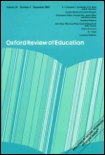
OXFORD REVIEW OF EDUCATION
Pioneering research that transforms educational landscapes.OXFORD REVIEW OF EDUCATION, published by Routledge Journals, Taylor & Francis Ltd, is a premier peer-reviewed academic journal dedicated to advancing research and scholarship in the field of education. Established in 1975, this esteemed journal has become a vital academic resource, currently holding a prestigious Q1 ranking in Education, with a Scopus rank of #260 out of 1543 in the Social Sciences - Education category, placing it in the top 17% of journals in its field. With a commitment to publishing articles that address both theoretical and practical aspects of education, the journal serves as a platform for innovative research, discussions, and insights that reflect contemporary educational practices and policies. Although not an open-access publication, the OXFORD REVIEW OF EDUCATION continues to foster scholarly dialogue and contribute significantly to the understanding of educational development and reform globally, making it an indispensable resource for researchers, educators, and policymakers alike.

Journal for Critical Education Policy Studies
Fostering Dialogue to Transform Educational PracticesJournal for Critical Education Policy Studies is a vital platform for researchers and practitioners in the field of education, dedicated to fostering dialogue and scholarly analysis on pressing educational policies and practices. Published by INST EDUCATION POLICY STUDIES in the United Kingdom, this open-access journal, ISSN 2051-0969, provides a unique forum for critical perspectives that interrogate established norms within education policy frameworks. Although currently ranked in the Q4 category of education journals and sitting in the 18th percentile in Scopus' Social Sciences Education rankings, it aspires to elevate discussions through its rigorous peer-reviewed articles and thoughtful critiques. Operating since 2015 and set to converge its efforts through 2024, the journal emphasizes accessibility and inclusivity, making its valuable knowledge available for free to the educational research community. With a commitment to critical examination and a global outreach, the Journal for Critical Education Policy Studies stands as an essential resource for those looking to challenge and shape the future of education policy.

TEACHERS COLLEGE RECORD
Illuminating Contemporary Issues in Teaching and PolicyTeachers College Record is a prestigious academic journal in the field of education, published by SAGE Publications Inc., that has been a leading resource since its inception in 1976. This journal serves as a platform for scholarly articles, research studies, and critical analyses that inform and advance the understanding of educational theory, policy, and practice. With an impressive Scopus Rank placing it at #490 out of 1543 in the Social Sciences - Education category and a Q2 quartile ranking for 2023, it is recognized for its rigorous peer-review process and significant contributions to the field. Researchers, educators, and students can expect to find cutting-edge discussions on contemporary issues, innovative methodologies, and evidence-based practices. Although the journal does not currently offer open access, it remains a vital asset for those dedicated to enhancing educational outcomes and fostering intellectual discourse.

Journal for Multicultural Education
Empowering diverse voices in educational discourse.Welcome to the Journal for Multicultural Education, an esteemed publication by Emerald Group Publishing Ltd, dedicated to advancing knowledge and practice in the dynamic fields of Cultural Studies, Education, and Linguistics. Since its inception in 2014, this journal has established itself as a leading forum for research, reflection, and discourse, addressing the multifaceted experiences of diverse cultures in educational contexts. With a commendable Scopus Rank placing it in the 87th percentile for Cultural Studies, the journal is positioned in the Q1 quartile, making it a premier outlet for scholars and practitioners looking to contribute to and engage with cutting-edge research. Our commitment to fostering an inclusive dialogue on multicultural education equips our readers with innovative strategies and insights essential for navigating today’s globalized society. While the journal operates under standard access provisions, we invite researchers, educators, and students alike to explore the rich tapestry of scholarly works published within these pages, and partake in a vibrant community dedicated to transformative education.